Ever since I can remember, the composer Mieczyslaw Weinberg has played a walk-on part in histories of Soviet music. If you find him in an index at all (probably under Vainberg or Vajnberg, and usually with the first name given him by a box-ticking Soviet border guard in 1939: Moisey, or even Moshe), you’ll usually end up reading one of those melancholy and unhelpful lists: “Shostakovich’s followers include...”
Grove’s Dictionary concedes a short and somewhat misleading entry: “His works are often based on a programme, largely autobiographical in nature.” Boris Schwarz, in the standard, generally excellent fat book on the subject, brings Weinberg in among a group who “lacked neither talent nor technical skill” but whose work around 1950 “showed a blandness, a conventionality” that “reflected the post-Zhdanov freeze”, though he does admit a few pages later that Weinberg’s music “deserves wider attention abroad”.
These vapid generalisations can now once and for all be airbrushed out and replaced by an altogether more vivid, individual and compelling portrait: that of a great composer whose music has been ignored for reasons that have little if anything to do with its actual quality or character. The current Bregenz Festival – famous for its “Opera on the Lake”, (this year Aida, alas, thunderstormed off on the night I planned to go) – has been featuring a major retrospective of Weinberg’s music which came to a head last weekend in a flurry of operatic and concert performances and a series of talks, symposia and discussions which left nobody in any doubt that this is a composer whose work needs to be incorporated in the repertoire in a big way, and fast.
We heard two operas (out of eight that he composed), a symphony (one of 27), a Requiem, four chamber orchestral works and two string quartets (out of 17), and in all this 10 hours or so of music there was hardly a disappointing movement, not one certain failure, no trace of Schwarz’s blandness or conventionality. The standard description of Weinberg as some kind of poor man’s Shostakovich was exposed as pure ignorant gossip, about as accurate as calling Brahms’s First Symphony “Beethoven’s Tenth”. Obviously Shostakovich is an influence, but no more than that. And so what? Weinberg’s emerges as a powerful individual voice within a strong tradition of which history has to some extent lost track. It’s clearly time to revise the image.
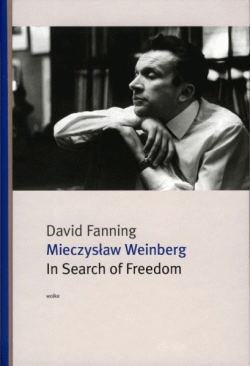 Weinberg’s story needs telling for its own sake, and has in fact been well told in a compact new biography by David Fanning (Mieczyslaw Weinberg: In Search of Freedom, Wolke Verlag, pictured left; Fanning is also at work on a more substantial study). Born in Warsaw in 1919, the son of Moldavian Jews who had lost family members in the Bessarabian pogrom of 1903, Weinberg was the sole member of his own immediate family to escape from the Nazis when they invaded Poland in September 1939: both his parents and his younger sister subsequently died in the concentration camp at Trawniki.
Weinberg’s story needs telling for its own sake, and has in fact been well told in a compact new biography by David Fanning (Mieczyslaw Weinberg: In Search of Freedom, Wolke Verlag, pictured left; Fanning is also at work on a more substantial study). Born in Warsaw in 1919, the son of Moldavian Jews who had lost family members in the Bessarabian pogrom of 1903, Weinberg was the sole member of his own immediate family to escape from the Nazis when they invaded Poland in September 1939: both his parents and his younger sister subsequently died in the concentration camp at Trawniki.
The idea of escaping to the Soviet Union is still quite hard for us pampered Westerners to swallow. But in fact Weinberg fared reasonably well in his new homeland, starting in the Belorussian capital, Minsk (where he was well-taught piano by a Rimsky-Korsakov pupil), heard Shostakovich’s music for the first time, and began serious composition on his own account.
Jews broadly were left alone during the Great Patriotic War in Russia, for obvious tactical reasons; but afterwards Weinberg, like every serious composer, was pulled up short by the Zhdanov purges of 1948, and (to be fair to Schwarz) his work list does for a time flag and a lot of the music is lost. That same year his father-in-law, the well-known actor Solomon Mikhoels, was murdered in a Minsk street, apparently on Stalin’s orders as part of a new wave of anti-Semitism, and five years later Weinberg himself was arrested in Moscow on a trumped-up charge partly connected with Mikhoels’s death. Perhaps fortunately for him, Stalin died a month after the arrest, and a few weeks later Weinberg was released. An intervention by Shostakovich – a close friend since 1943 – probably helped.
The rest of Weinberg’s life (he died in 1996) was calm, but Soviet. Works were commissioned and performed; he was productive, professional, well regarded. But he was working within a system that did not export. Shostakovich – having established his stature and notoriety early on – was the sole worthwhile exception. Soviet orchestras visiting the West otherwise brought (if anything modern) the most faceless examples of regime fodder, while strong-profiled composers like Weinberg were kept under wraps.
And in any case the West, post-Darmstadt, was no longer much interested in middle-of-the-road modernism – look what happened to our own Western traditionalists, the Dutilleuxs, the Simpsons, the Holmboes, in the Sixties and Seventies. Time may yet show that it was precisely the stern constraints of Socialist Realism that protected the best Soviet composers from the more studious imbecilities of the Sixties avant-garde, though it also, of course, encouraged an avalanche of junk.
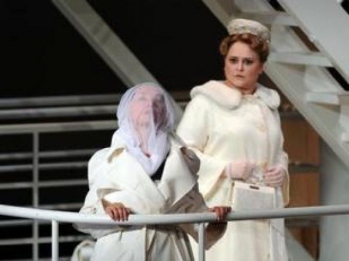 But there is nothing of this in Weinberg. The best of the works heard in Bregenz were his first opera, Passazhierka (sung here in a mixture of German and Russian as Die Passagierin – “The Woman on the Ship”, pictured right); his Sixth Symphony; and the Third and Fifteenth String Quartets, brilliantly played by the Quatuor Danel as part of the Monday symposium on Weinberg’s music. The opera, which I was unable to get to (at the very start of the weekend) but was able to hear and see in a not yet fully edited DVD of the production kindly shown me by the festival director David Pountney, is an ambitious and astonishingly powerful dramatisation of a story by the Polish novelist Zofia Posmysz, set partly in Auschwitz, partly on board a postwar transatlantic liner whose passengers include a female warder from the extermination camp and a survivor, Marta, one of her former charges (presumably the Passagierin of the title, though it could equally apply to herself).
But there is nothing of this in Weinberg. The best of the works heard in Bregenz were his first opera, Passazhierka (sung here in a mixture of German and Russian as Die Passagierin – “The Woman on the Ship”, pictured right); his Sixth Symphony; and the Third and Fifteenth String Quartets, brilliantly played by the Quatuor Danel as part of the Monday symposium on Weinberg’s music. The opera, which I was unable to get to (at the very start of the weekend) but was able to hear and see in a not yet fully edited DVD of the production kindly shown me by the festival director David Pountney, is an ambitious and astonishingly powerful dramatisation of a story by the Polish novelist Zofia Posmysz, set partly in Auschwitz, partly on board a postwar transatlantic liner whose passengers include a female warder from the extermination camp and a survivor, Marta, one of her former charges (presumably the Passagierin of the title, though it could equally apply to herself).
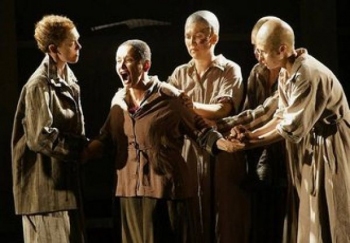 The warder Lisa, now a smart civilian travelling with her diplomat husband, is haunted by the woman, whom she half-recognises and whose presence drives her into an agony of guilt-wracked memory. She and we are transported back to Auschwitz itself (pictured left); we witness the horrors of the women’s compound, the brutal, inhuman behaviour of the guards, the constant love and self-sacrifice of the inmates (mostly, but perhaps not entirely, Jews: Jesus is invoked, and a Russian prisoner sings a folk-song). Above all we compare Lisa’s self-exculpating account of how she tried to help Marta and her fiancé, with the reality of her sly attempts to ingratiate herself with her possible future accusers and her vicious resentment when her help is neither accepted nor welcomed.
The warder Lisa, now a smart civilian travelling with her diplomat husband, is haunted by the woman, whom she half-recognises and whose presence drives her into an agony of guilt-wracked memory. She and we are transported back to Auschwitz itself (pictured left); we witness the horrors of the women’s compound, the brutal, inhuman behaviour of the guards, the constant love and self-sacrifice of the inmates (mostly, but perhaps not entirely, Jews: Jesus is invoked, and a Russian prisoner sings a folk-song). Above all we compare Lisa’s self-exculpating account of how she tried to help Marta and her fiancé, with the reality of her sly attempts to ingratiate herself with her possible future accusers and her vicious resentment when her help is neither accepted nor welcomed.
The ending is inconclusive. Marta seems to be thrusting Lisa into the Atlantic Ocean of her own unassuageable embitteredness. But there is no splash. And in an epilogue we see Marta, still youngish, middle-class, jumpered, her hair regrown, sitting by a river remembering her murdered fellow prisoners and vowing never to forget “their tears, their smiles, their love”.
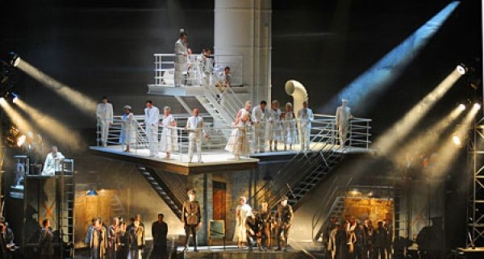 An opera on this subject, relentlessly dramatised over some three hours, without significant humour or moral ambiguity, might well have become laboured or even mawkish. That Weinberg sustains concentration without those elements of detachment is partly, I suppose, a sign of his personal stake in the subject matter. Certainly the sense of place, and the psychological vividness, are horribly exact, in a way I haven’t previously experienced in any dramatisation of these events (certainly not in Spielberg). Some of this is due, of course, to Pountney’s marvellously observed but tactful, carefully understated direction, and Johan Engels’s clever multi-level set (pictured above), which - as Gurnemanz puts it in Parsifal – converts time into space.
An opera on this subject, relentlessly dramatised over some three hours, without significant humour or moral ambiguity, might well have become laboured or even mawkish. That Weinberg sustains concentration without those elements of detachment is partly, I suppose, a sign of his personal stake in the subject matter. Certainly the sense of place, and the psychological vividness, are horribly exact, in a way I haven’t previously experienced in any dramatisation of these events (certainly not in Spielberg). Some of this is due, of course, to Pountney’s marvellously observed but tactful, carefully understated direction, and Johan Engels’s clever multi-level set (pictured above), which - as Gurnemanz puts it in Parsifal – converts time into space.
But the ultimate achievement is necessarily musical. Passazhierka is by no means an early work (it was completed in 1968, and Weinberg never saw it staged). Yet it shows consistent mastery of the basic tools of music drama: the pacing, the sense of transition (crucial in a work that bounces back and forth in time and place), distinctions of character, and that power that music has, but doesn’t always use, of humanising its subjects.
By this time Weinberg had composed nine or 10 symphonies, so his control of large-scale structure is perhaps to be expected. What may surprise is the brilliance and beauty of his writing for the voice. This is real singers’ music, music that soars, that floats, that talks, that serves the words in countless trivial and crucial ways, and completely engages one in the thoughts and feelings of the individual characters.
There are few miscalculations: perhaps a verse too many of the folksong, a dance too many of the commandant’s favourite waltz. Somewhere in the background is the Shostakovich of Lady Macbeth; but it is a very distant, fragmented background. Weinberg’s music is his own. Clearly Passazhierka should be a repertory work, and it’s very good news indeed that this is a co-production with (among others) English National Opera, and will be seen there in 2012.
Teodor Currentzis conducted a performance of overpowering energy and intensity, finely played by the Vienna Symphony Orchestra and superbly sung and vividly acted by a cast much too large to identify individually. One inevitably singles out Elena Kelessedi’s Marta and Michelle Breedt’s Lisa, both unforgettable. But this was a company triumph, with no significant weakness.
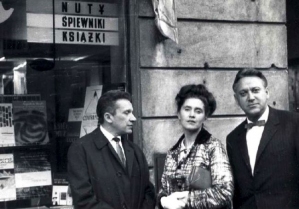 The other definite masterpiece at Bregenz was the Sixth Symphony, which Vladimir Fedoseyev conducted in a morning concert in the Festspielhaus with the Vienna Symphony Orchestra and the Vienna Boys’ Choir. This was one of the rather few Weinberg works I already knew (there is a good Melodiya CD under Kondrashin, pictured left with his wife and Weinberg, who conducted the Moscow premiere in 1963). But concert performances in the West have been practically – if not entirely – unknown. The Sixth is one of several Weinberg symphonies that set texts, which may be what prompted the Grove remark about programmes. But the references here are oblique. The three vocal movements (out of five) are entirely for boys' choir, deeply touching settings of Russian poems about the destruction of childhood by war. They reveal the composer as a master of another vital weapon in the dramatist’s armoury: simplicity.
The other definite masterpiece at Bregenz was the Sixth Symphony, which Vladimir Fedoseyev conducted in a morning concert in the Festspielhaus with the Vienna Symphony Orchestra and the Vienna Boys’ Choir. This was one of the rather few Weinberg works I already knew (there is a good Melodiya CD under Kondrashin, pictured left with his wife and Weinberg, who conducted the Moscow premiere in 1963). But concert performances in the West have been practically – if not entirely – unknown. The Sixth is one of several Weinberg symphonies that set texts, which may be what prompted the Grove remark about programmes. But the references here are oblique. The three vocal movements (out of five) are entirely for boys' choir, deeply touching settings of Russian poems about the destruction of childhood by war. They reveal the composer as a master of another vital weapon in the dramatist’s armoury: simplicity.
Perhaps Weinberg has learnt something here, too, from Shostakovich, who incidentally is supposed to have wished he could put his name to this symphony. In some ways the music does suggest the transparent, winding voice-and-orchestra textures of his recently premiered Thirteenth. But Weinberg is never Shostakovichian for long. The two orchestral movements of his Sixth are richly polyphonic in a quite individual manner: not Bachian, not Bergian, perhaps faintly at times Mahlerian. Yet there is a kind of grip to Weinberg’s symphonic writing that escapes the hesitations and insecurities of the Mahler tradition, just as his satire – as in the brass-dominated third movement of this Sixth Symphony – can seem more directed, less mechanical than Shostakovich’s, though the pedigree is I suppose similar.
And Weinberg’s material is invariably striking, confident, highly personable, strongly fingerprinted, his orchestration sharp and incisive, with memorable recourse to solo sonorities, wind, string or keyboard. This is in every way a marvellous symphony.
The shimmering third movement of String Quartet No 3 is as beautiful a piece of quartet-writing as anything in Shostakovich
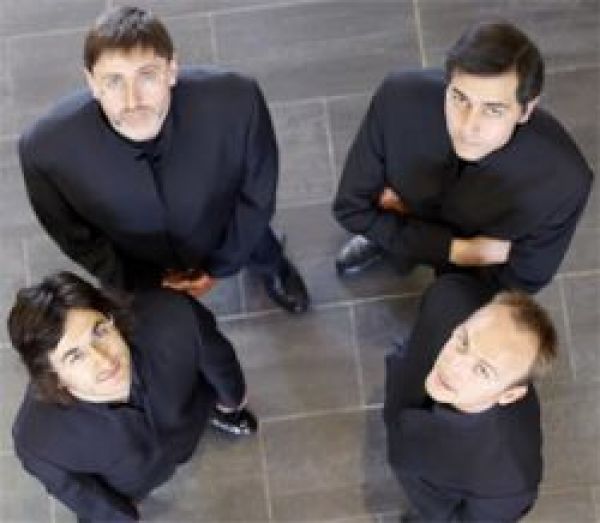 There was a lot else to admire in the Bregenz retrospective. The two quartets played by the Quatuor Danel (pictured right) are far apart in years and idiom (No 3, 1944; No 15, 1979), but equally surefooted in the handling of this unforgiving medium. The shimmering third movement of No 3 is as beautiful a piece of quartet-writing as anything in Shostakovich, while the more intricate nine-movement Fifteenth reminded us that Weinberg was never tied to conventional ideas about form, nor was his style, even in Soviet times, limited to the crude assumptions of the Composers’ Union. The Danel have recorded all Weinberg’s quartets, by the way, and have been playing them (almost in secret, one might suppose) for the past 15 years, culminating in a complete cycle at Manchester University, where they are now resident.
There was a lot else to admire in the Bregenz retrospective. The two quartets played by the Quatuor Danel (pictured right) are far apart in years and idiom (No 3, 1944; No 15, 1979), but equally surefooted in the handling of this unforgiving medium. The shimmering third movement of No 3 is as beautiful a piece of quartet-writing as anything in Shostakovich, while the more intricate nine-movement Fifteenth reminded us that Weinberg was never tied to conventional ideas about form, nor was his style, even in Soviet times, limited to the crude assumptions of the Composers’ Union. The Danel have recorded all Weinberg’s quartets, by the way, and have been playing them (almost in secret, one might suppose) for the past 15 years, culminating in a complete cycle at Manchester University, where they are now resident.
We also heard a series of chamber-orchestral works, stunningly dispatched by the youthful MusicAeterna Chamber Orchestra from Novosibirsk under the unstoppable Teodor Currentzis. This was lesser Weinberg in a way, but still immaculate, conscientious work: a somewhat introspective Chamber Symphony (No 4), a Moravian Rhapsody (just post-Zhdanov), a dazzling Flute Concerto – played with astonishing bravura by Maria Fedotova – and a mildly aggressive Sinfonietta (No 2). Weinberg apparently felt that, as the sole survivor, he had an inalienable duty to work day and night to produce - and not just any old stuff, but the best he could do. In this respect his minor works are hardly less revealing than the major ones.
Flautist Alexander Korneyev, conductor Rudolf Barshai and the Moscow Chamber Orchestra perform part one of Weinberg's Flute Concerto:
Some of the majors, in any case, are not without their problems. The so-called Requiem, a setting of secular poetry about war, composed in the mid-Sixties in the shadow of Britten’s War Requiem but before Shostakovich’s Fourteenth (which it perhaps influenced), is an hour-long work of consistent interest and intermittent beauty which somehow, though, fails to shake the withers, as must have been the intention.
A second opera, The Portrait, based on a Gogol story about a painter torn between fulfilling his artistic mission and catering to the philistine market of official portraiture, seemed to ramble too much in between episodes of arresting invention. It was strongly cast (Peter Hoare and David Stout outstanding as the painter and his servant), well conducted by Rossen Gergov, and cleverly staged by John Fulljames with witty and effective projections (designer Dick Bird, lighting Bruno Poet) for the magical materialisation of portrait subjects into the real world. Whether its excessive and repetitious length can be overcome in performance (it was already substantially cut here) will be tested again when Pountney himself stages it for Opera North – enterprising as ever - next February. But I’m not entirely confident.
Whatever that particular outcome, Weinberg is now firmly on the map. Why it has taken so long to get him there is a good case study for students of what musicologists call "The Canon": everything by Shostakovich (however rubbishy), nothing by Weinberg (however brilliant). We have David Pountney and his Bregenz team, including Fanning himself, who gave talks and was prominent in the symposia, to thank for the fact that this will now surely change. It can’t happen soon enough.
- The Bregenz Festival continues until August 22
- Buy the music of Mieczyslaw Weinberg on Amazon
- See theartsdesk's European Festivals 2010 Round-up

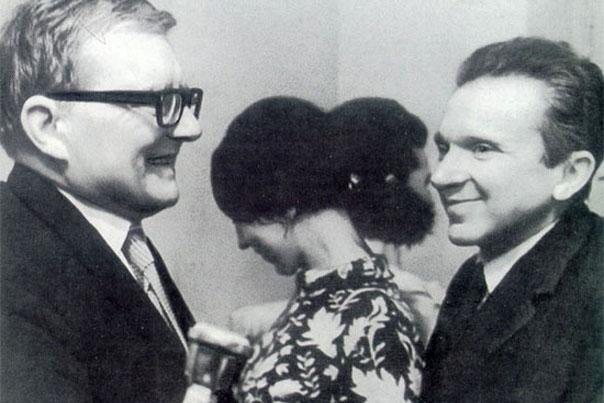













Add comment